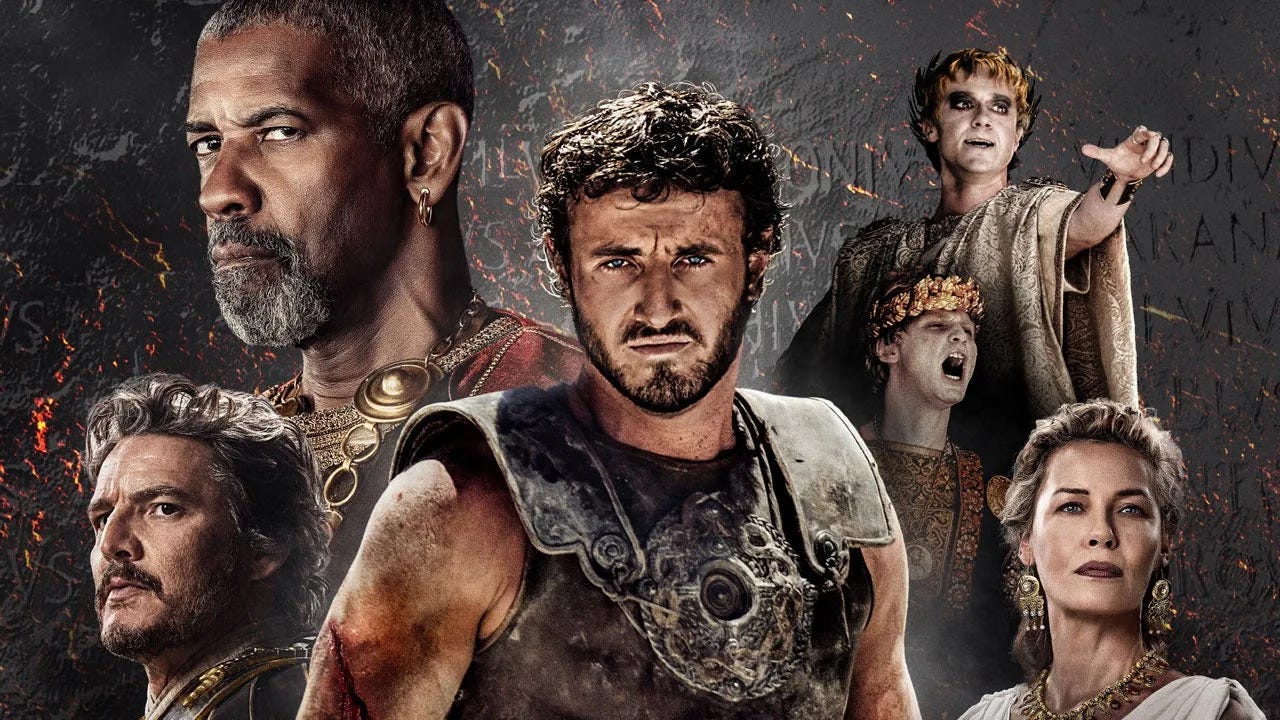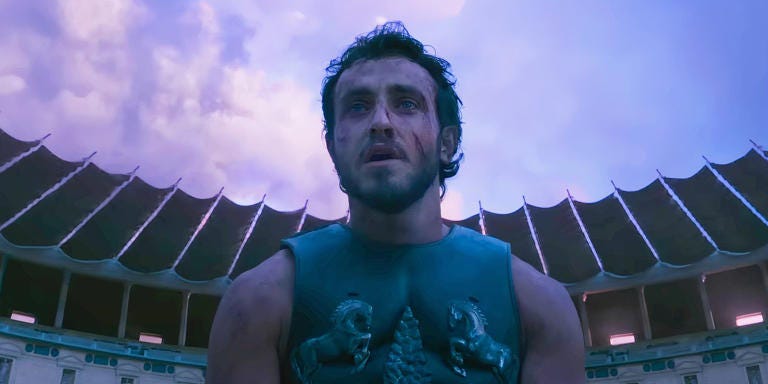MINIMAL SPOILERS
Ridley Scott returned to the scene this year with the long-awaited Gladiator II. People have buzzed about a potential sequel to Scott’s well-received Gladiator film since shortly after its release. The original movie stuck with audiences and critics alike with its inspiring story, fantastic performances, and lovely cinematography. Gladiator II had a mountainous legacy to live up to, but it may have drowned in the process.
There are many wonderful things to say about Gladiator II. Paul Mescal stars as Hanno — aka Lucius — an enslaved man taken from Numidia in the seizing and slaughter of his city by the Roman Empire. His performance balances Mescal’s typical sad-boy persona with the heroics essential to the story. Denzel Washington gives a stand-out performance as the gladiator owner Macrinus. Joseph Quinn and Fred Hechinger portray the cruel and clueless twin emperors Geta and Caracalla with eerie skill.
The film is also filled with beautiful images, which comes as no shock from Ridley Scott. The shots feel gritty when necessary. I could almost smell the stink of the gladiators. Some shots are so ethereal that they may even pass up the original. The image of Lucius watching his wife in the afterlife has stuck with me since I saw it. Another takes place at the end, with the clouds moving behind Lucius’s head, calling back to the images in the original movie of Maximus traveling with the landscape moving behind him. The homage is clear, but it has its own perspective.
Despite the technical accomplishments of Gladiator II, it faces several issues. Some trivial and some more impactful. There is far too much CGI, particularly in the action sequences. The movie leans on CGI animals for its action instead of choreographed fights between actors. This not only looks worse, but it also takes away some of the drama and stakes of the fights. Instead of watching Lucius take down increasingly strong opponents, we watch him defeat baboons and sharks. Some action is very well done, but most of the colosseum fights fall flat.
The film also struggles to fight its legacy sequel status, teetering between reiterating the original and finding its own voice. The narrative is not a copy and paste. There are plenty of deviations. However, it cannot seem to escape the weight of its predecessor. Maximus looms over the characters and, as a result, the movie itself. Some of this is inescapable with a legacy sequel, but the issue comes when the movie cannot decide which way to lean. It simultaneously tries to separate itself thematically but desperately needs the connection to remain interesting.
That being said, Gladiator II does have things to say. While Gladiator was filled with hope for a better future, the sequel is more critical of those offering dreams come true. That skepticism fits an audience that more critical of promises than those in the past. Oddly enough, the film meets the political and cultural moment with the right balance. Lucius is fueled by rage instead of justice, and he has to become a hero instead of already having the skills.
The twin emperors also display a different version of corruption which is more accurate to modern perceptions. They have no villain origin story like Commodus. Instead, they portray an inbred, ignorantly cruel form of corruption that feels more nonsensical. Corruption as the assumption matches much more how many people feel today. This movie confronts the idea of Rome and its greatness through that assumption. Characters talk about the cycles of power and the inevitability of rises and falls. The “Dream of Rome” that Marcus Aurelius proposed in the first movie is met with much of skepticism in the sequel. Even the most hopeful characters treat it like a dream to strive for rather than a reality they can achieve.
However, when the movie confronts that idea, it takes a step back to remind the audience that we should like this movie because we liked the first one. The essential issue with Gladiator II is that it cannot escape its expectations. It wants to be bigger, grander, and more spectacular than its predecessor, but it is at its best in the smaller-scale moments.
While still an entertaining movie that I enjoyed, Gladiator II reminds us what can happen when ambition gets the best of us. At the end of the day, we love Ridley Scott for his ambition. However, for a story warning against ambition and power, it is ironic that it cannot escape those forces itself.





